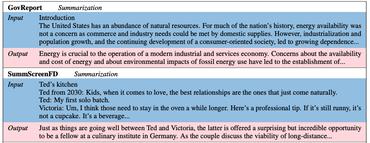Search Results for author: Zhenghao Chen
Found 14 papers, 3 papers with code
Peer-aided Repairer: Empowering Large Language Models to Repair Advanced Student Assignments
no code implementations • 2 Apr 2024 • Qianhui Zhao, Fang Liu, Li Zhang, Yang Liu, Zhen Yan, Zhenghao Chen, Yufei Zhou, Jing Jiang, Ge Li
Automated generation of feedback on programming assignments holds significant benefits for programming education, especially when it comes to advanced assignments.
UFDA: Universal Federated Domain Adaptation with Practical Assumptions
no code implementations • 27 Nov 2023 • Xinhui Liu, Zhenghao Chen, Luping Zhou, Dong Xu, Wei Xi, Gairui Bai, Yihan Zhao, Jizhong Zhao
Conventional Federated Domain Adaptation (FDA) approaches usually demand an abundance of assumptions, which makes them significantly less feasible for real-world situations and introduces security hazards.
Neural Vector Fields: Generalizing Distance Vector Fields by Codebooks and Zero-Curl Regularization
no code implementations • 4 Sep 2023 • Xianghui Yang, Guosheng Lin, Zhenghao Chen, Luping Zhou
Recent neural networks based surface reconstruction can be roughly divided into two categories, one warping templates explicitly and the other representing 3D surfaces implicitly.
Neural Vector Fields: Implicit Representation by Explicit Learning
2 code implementations • CVPR 2023 • Xianghui Yang, Guosheng Lin, Zhenghao Chen, Luping Zhou
Deep neural networks (DNNs) are widely applied for nowadays 3D surface reconstruction tasks and such methods can be further divided into two categories, which respectively warp templates explicitly by moving vertices or represent 3D surfaces implicitly as signed or unsigned distance functions.
Improving RGB-D Point Cloud Registration by Learning Multi-scale Local Linear Transformation
1 code implementation • 31 Aug 2022 • ZiMing Wang, Xiaoliang Huo, Zhenghao Chen, Jing Zhang, Lu Sheng, Dong Xu
In addition to previous methods that seek correspondences by hand-crafted or learnt geometric features, recent point cloud registration methods have tried to apply RGB-D data to achieve more accurate correspondence.
LSVC: A Learning-Based Stereo Video Compression Framework
no code implementations • CVPR 2022 • Zhenghao Chen, Guo Lu, Zhihao Hu, Shan Liu, Wei Jiang, Dong Xu
In this work, we propose the first end-to-end optimized framework for compressing automotive stereo videos (i. e., stereo videos from autonomous driving applications) from both left and right views.
Improving Facial Attribute Recognition by Group and Graph Learning
no code implementations • 28 May 2021 • Zhenghao Chen, Shuhang Gu, Feng Zhu, Jing Xu, Rui Zhao
For the spatial correlation, we aggregate attributes with spatial similarity into a part-based group and then introduce a Group Attention Learning to generate the group attention and the part-based group feature.
Improving Deep Video Compression by Resolution-adaptive Flow Coding
no code implementations • ECCV 2020 • Zhihao Hu, Zhenghao Chen, Dong Xu, Guo Lu, Wanli Ouyang, Shuhang Gu
In this work, we propose a new framework called Resolution-adaptive Flow Coding (RaFC) to effectively compress the flow maps globally and locally, in which we use multi-resolution representations instead of single-resolution representations for both the input flow maps and the output motion features of the MV encoder.
Disentangling and Unifying Graph Convolutions for Skeleton-Based Action Recognition
4 code implementations • CVPR 2020 • Ziyu Liu, Hongwen Zhang, Zhenghao Chen, Zhiyong Wang, Wanli Ouyang
Spatial-temporal graphs have been widely used by skeleton-based action recognition algorithms to model human action dynamics.
 Ranked #4 on
3D Action Recognition
on Assembly101
Ranked #4 on
3D Action Recognition
on Assembly101
Composition and decomposition of GANs
no code implementations • 23 Jan 2019 • Yeu-Chern Harn, Zhenghao Chen, Vladimir Jojic
In this work, we propose a composition/decomposition framework for adversarially training generative models on composed data - data where each sample can be thought of as being constructed from a fixed number of components.
Visual Analytics of Movement Pattern Based on Time-Spatial Data: A Neural Net Approach
no code implementations • 9 Jul 2017 • Zhenghao Chen, Jianlong Zhou, Xiuying Wang
This method aggregates three main parts that are Back-end Data Model, Neural Net Algorithm including clustering method Self-Organizing Map (SOM) and prediction approach Recurrent Neural Net (RNN) for ex- tracting the features and lastly a solid front-end that displays the results to users with an interactive system.
Tuned Models of Peer Assessment in MOOCs
no code implementations • 9 Jul 2013 • Chris Piech, Jonathan Huang, Zhenghao Chen, Chuong Do, Andrew Ng, Daphne Koller
In massive open online courses (MOOCs), peer grading serves as a critical tool for scaling the grading of complex, open-ended assignments to courses with tens or hundreds of thousands of students.
Sparse Filtering
no code implementations • NeurIPS 2011 • Jiquan Ngiam, Zhenghao Chen, Sonia A. Bhaskar, Pang W. Koh, Andrew Y. Ng
Unsupervised feature learning has been shown to be effective at learning representations that perform well on image, video and audio classification.
Tiled convolutional neural networks
no code implementations • NeurIPS 2010 • Jiquan Ngiam, Zhenghao Chen, Daniel Chia, Pang W. Koh, Quoc V. Le, Andrew Y. Ng
Using convolutional (tied) weights significantly reduces the number of parameters that have to be learned, and also allows translational invariance to be hard-coded into the architecture.










